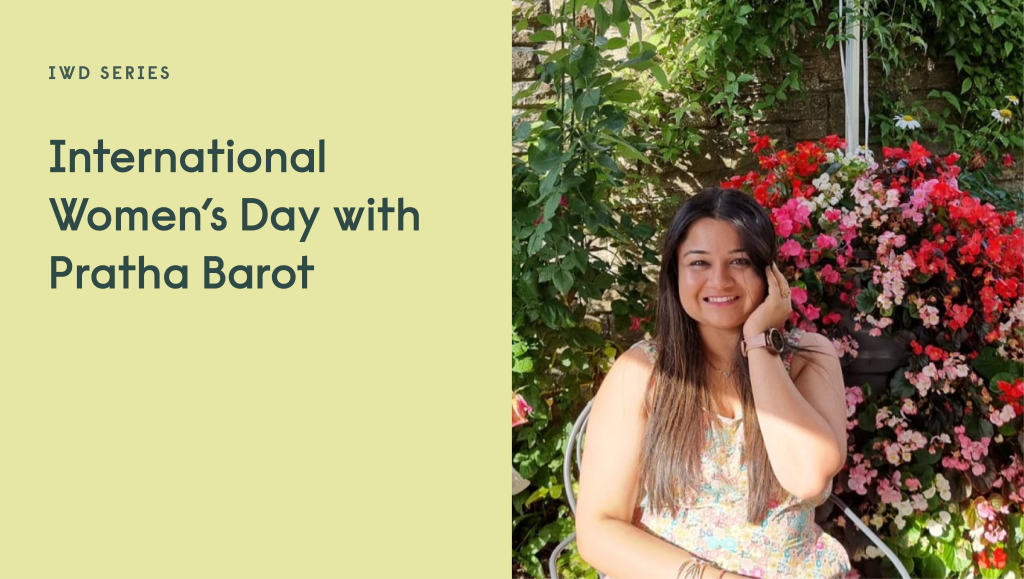Celebrating International Women’s Day: Pratha Barot
This International Women’s Day, hear from some of the women behind our work at Protas
Today, less than 30% of the world’s researchers are women. Meanwhile, in technology, women are also the minority, comprising less than a third of the global workforce in tech-related fields.
This International Women’s Day, we spoke to the women working at Protas about what’s going well and what we can do to enable change.

Tell us a bit about yourself.
I was born and grew up in India, in Gujarat. After graduating with a master’s in medical biotechnology and taking my post advanced diploma in International Intellectual Property Rights, I began my career in a law firm as a patent associate, advising on new patents specifically for research in the medical industry.
I moved to the UK after I met my husband. At first, I worked in a few different companies in quality roles before moving into software validation, particularly from the quality perspective. I had my baby in March last year, and by August I had joined the team here.
My role at Protas is to help develop, test and validate our unified clinical trials management platform (UCTMP), as well as other software. I enjoyed the research element of my master’s and was keen to find a career where I could use these skills. I love working in a start-up environment like Protas, you can both contribute and learn so much.
What do you like about your role at Protas?
It’s important to me that I’m really behind the product I’m working on. I have worked in clinical trials previously, and I have seen that often the process is very expensive and the tech can be complicated. At Protas, it’s about reducing the cost of clinical trials and making things simpler, so that more and more people have access to the treatment they need.
Building the UCTMP so that it is simple to use but will enable multiple large-scale, randomised clinical trials to run at the same time certainly has its challenges. But it’s going to be really positive for the healthcare industry and for people, so I’m excited to see the results.
What are your greatest achievements?
I went to an English-medium (English-speaking) school in India, as my parents wanted to make sure that I wasn’t going to be confined to one single country because of language. Through their encouragement and sacrifices, I’ve worked hard at learning English, but also never limiting myself to one role. Instead, I always look for challenges and places where I can grow.
I have come up against plenty of challenges. For instance, moving to the UK, I must have done hundreds of interviews and, at first, I didn’t get the break I was hoping for.
I’m proud to be working at Protas today because I’m learning here, but I also know that the organisation can benefit from my experience. It shows that with time, patience and hard work, things do pay off. While communication isn’t always perfect, today it’s my work that really speaks for itself.
What advice would you give to women pursuing a career like yourself?
Other people’s perceptions can hinder you from achieving your goals. Don’t let that happen. You have to believe in yourself no matter what and not be put off from applying for challenging roles.
What thoughts do you have about how we can tackle gender bias?
As an Indian woman, I had to break many stereotypes growing up. Most of Indian society has a preference for sons over daughters. Things were so bad that during the nineties, the decade that my sister and I were born and were growing up in, it became illegal to find out during pregnancy if you are going to have a boy or a girl – and it remains illegal.
But the gender bias also still exists today. When I had my own baby, I had to actively block people who said things about preferring a boy. Girls and women are so important in this world, we still need to fight to make that known.
That’s why I have always taken part in protests and debate. At university, and still to this day, I have supported the Save the Girl Child campaign. I’m part of Facebook community groups and I often write blogs to get my thoughts out and encourage women to be themselves, to understand their worth and to seek financial independence. By creating independence in women, we are creating opportunity for women to not just survive but thrive.